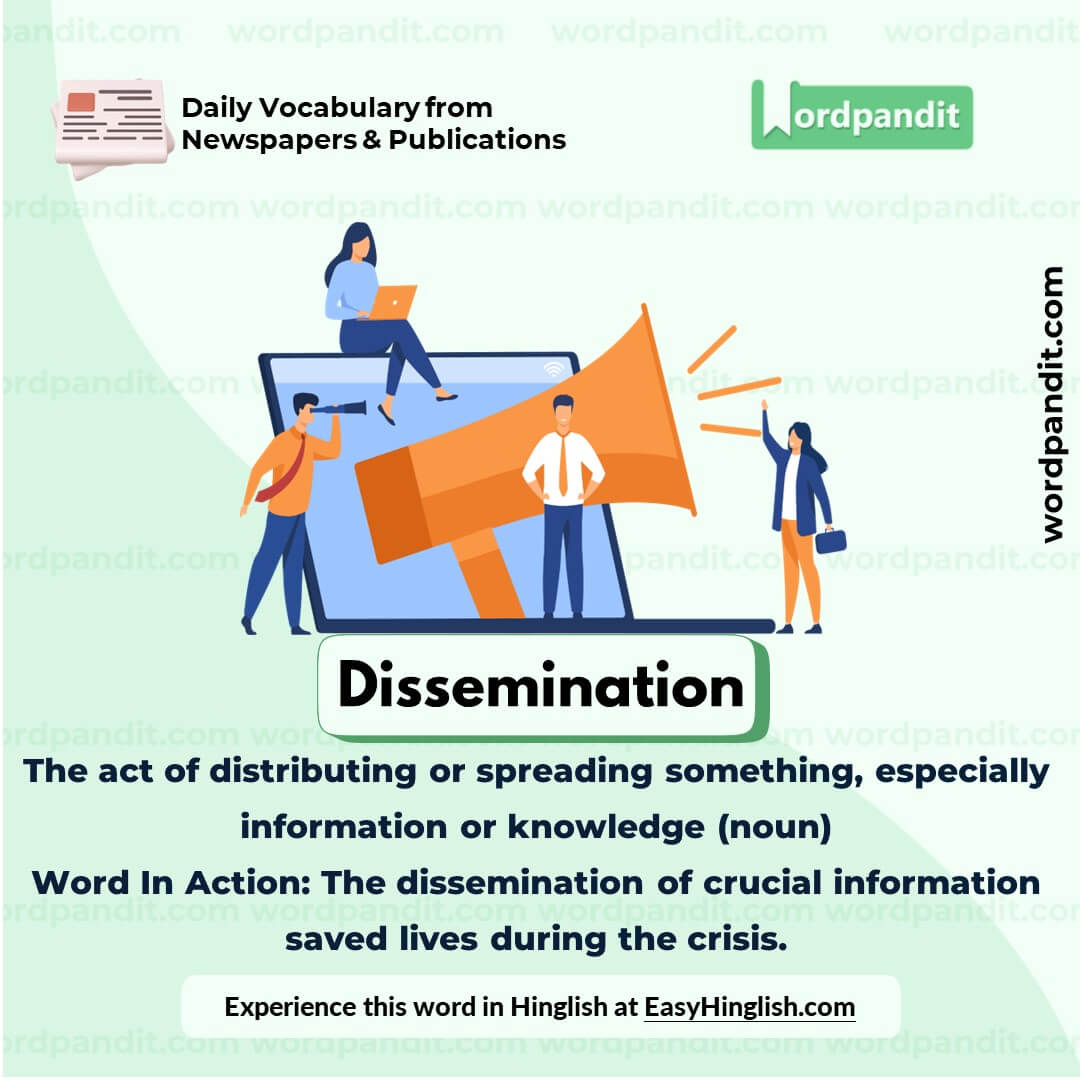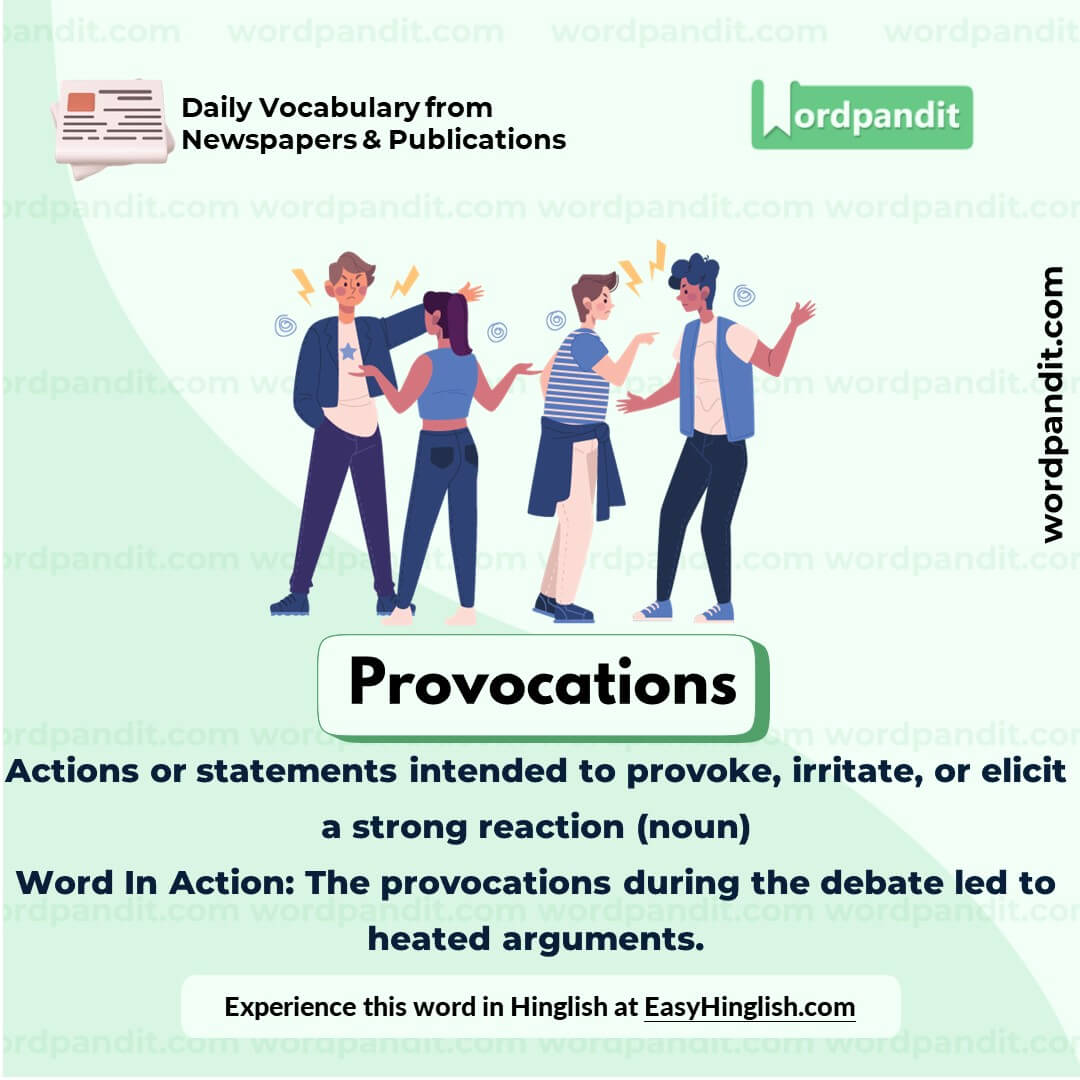Daily Vocabulary from Indian Newspapers and Publications
Welcome to Wordpandit’s Indian Vocabulary Hub
At Wordpandit, we understand the importance of staying rooted in the local context while expanding your language skills. This section focuses on enriching your vocabulary with words and phrases drawn from India’s leading newspapers and publications, ensuring you're learning vocabulary that is practical, relevant, and uniquely Indian.
Why Indian Sources Matter
We believe that the best way to master any language is by immersing yourself in local content. That’s why we carefully curate vocabulary from top Indian publications, including:
- The Hindu
- The Times of India
- The Economic Times
- Hindustan Times
- Live Mint
- The Indian Express
- And many others...
Stay Updated, Stay Relevant
With daily updates from Indian news sources, you’ll be consistently learning words that reflect the trends and shifts in Indian society and culture. Our focus is to provide vocabulary that enhances your understanding of the language in an Indian context.
How Wordpandit Supports Your Goals
Whether you’re preparing for exams, aiming to improve your professional communication, or simply want to stay connected with the latest Indian vocabulary, Wordpandit is here to guide you every step of the way.
Learn with a Practical Approach
Our interactive learning methodology includes real-world examples, engaging activities, and context-specific usage to ensure that every word becomes part of your active vocabulary.
Dive into Indian Vocabulary Today!
Why Choose Wordpandit?
Practical Learning: Focus on words you'll actually encounter in real-world reading, enhancing your comprehension and communication skills.
Diverse Content: From current affairs to scientific breakthroughs, our varied sources expose you to vocabulary across multiple domains.
Effortless Integration: Make Wordpandit a part of your daily routine. Just a few minutes each day can significantly boost your lexicon over time.
Your Path to Vocabulary Mastery
- Visit our Daily Vocabulary section regularly
- Explore new words and their usage in context
- Practice incorporating these words into your own writing and speech
- Track your progress as your vocabulary expands
Start Your Journey Today
Embark on your vocabulary enhancement journey with Wordpandit. By consistently engaging with our daily posts, you'll build a robust vocabulary that serves you well in academic, professional, and personal contexts.
Remember, a word a day keeps linguistic limitations at bay. Make Wordpandit your daily companion in the quest for vocabulary excellence!
WORD-1: Dissemination
Context:
"Departmental turf guarding has led to the compartmentalisation of intelligence gathering and dissemination by Indian agencies." - The Wire
Explanatory Paragraph:
"Dissemination" refers to the act of spreading information, knowledge, or ideas widely. In this context, it describes the distribution of intelligence information to ensure it reaches the appropriate parties. The word often highlights a deliberate and systematic process of making information accessible to a broader audience.
Meaning: The act of distributing or spreading something, especially information or knowledge (noun).
Pronunciation: dih-seh-muh-nay-shun
Difficulty Level: ⭐⭐⭐ Intermediate
Etymology: Derived from the Latin word "disseminare," meaning "to scatter or sow," combining "dis-" (apart) and "seminare" (to plant).
Synonyms & Antonyms:
Synonyms: Distribution, circulation, broadcasting, propagation
Antonyms: Concealment, withholding, suppression
Usage Examples:
- The organization is responsible for the dissemination of accurate health guidelines during emergencies.
- The professor emphasized the dissemination of research findings to non-academic audiences.
- Advancements in technology have revolutionized the dissemination of information globally.
- Secrecy policies can hinder the effective dissemination of intelligence reports among departments.
Cultural Reference:
"In the digital age, dissemination has taken on new dimensions, with social media playing a pivotal role in how information is spread and consumed worldwide." - Tech Times
Think About It:
How can organizations ensure that the dissemination of critical information is both efficient and secure?
Quick Activity:
Identify an example from recent news where the dissemination of information had a significant impact on public awareness or policy decisions. Write a short paragraph about it.
Memory Tip:
Think of "dissemination" as planting seeds of knowledge far and wide, just like farmers scatter seeds to grow crops.
Real-World Application:
Dissemination is crucial in various fields, including healthcare (spreading awareness about diseases), education (sharing knowledge), and government (communicating policies and alerts). Its effectiveness often determines how well people can act on critical information.
WORD-2: Provocations
Context:
"Sankaran argues that it is not what these weapons physically do but what the response of decision-makers in target states to these provocations is likely to be." - The Wire
Explanatory Paragraph:
"Provocations" refer to deliberate actions or statements intended to incite a reaction, often one of anger, retaliation, or heightened tension. In this context, it highlights the ways in which certain acts, such as deploying specific weapons, can elicit strategic or political responses from decision-makers, potentially escalating conflicts.
Meaning: Actions or statements intended to provoke, irritate, or elicit a strong reaction (noun).
Pronunciation: proh-vuh-kay-shuns
Difficulty Level: ⭐⭐⭐ Intermediate
Etymology: From the Latin word "provocare," meaning "to call forth or challenge," combining "pro-" (forth) and "vocare" (to call).
Synonyms & Antonyms:
Synonyms: Incitement, instigation, aggravation, challenge
Antonyms: Pacification, appeasement, conciliation
Usage Examples:
- The country's military exercises near the border were seen as clear provocations by its neighbor.
- The protestors used loud chants as provocations to draw attention to their cause.
- The author's controversial book was filled with provocations designed to challenge societal norms.
- Despite the provocations, the leader maintained a calm and measured response to avoid escalation.
Cultural Reference:
"Provocations have historically been used as tools in political strategy, such as during the Cold War, where acts of brinkmanship tested the resolve of rival states." - History Review Journal
Think About It:
How can leaders distinguish between genuine threats and mere provocations in high-pressure situations?
Quick Activity:
List two historical examples where provocations led to significant conflicts or negotiations. Briefly explain the outcomes of these situations.
Memory Tip:
Think of "provocations" as provocations pulling a string that triggers a reaction, just like pulling a lever starts a chain reaction.
Real-World Application:
Understanding provocations is crucial in fields like diplomacy and conflict resolution, where recognizing and managing provocative actions can prevent escalation and maintain peace. It is also a valuable concept in analyzing human behavior and interpersonal relationships.
WORD-3: Threshold
Context:
"An honest appraisal of the military’s present technological threshold is likely to point to large gaps in the capability to adapt rapidly to emerging challenges." - The Wire
Explanatory Paragraph:
"Threshold" refers to a starting point, limit, or level at which something begins or changes. In this context, it signifies the current level of technological advancement within the military, indicating the boundary of their existing capabilities and what they might need to achieve to meet future challenges.
Meaning: The point or level at which something begins, changes, or is noticeable (noun).
Pronunciation: thresh-hold
Difficulty Level: ⭐⭐⭐ Intermediate
Etymology: Originating from Old English "therscold" (meaning a doorstep), it figuratively came to represent a starting point or entry to a new state.
Synonyms & Antonyms:
Synonyms: Limit, boundary, brink, verge
Antonyms: Peak, zenith, culmination
Usage Examples:
- The scientist determined the threshold at which the chemical reaction would begin.
- Many industries are approaching the threshold of automation, transforming their operations entirely.
- The athlete pushed himself to the threshold of his endurance during the competition.
- Her income just crossed the threshold required to qualify for the housing subsidy.
Cultural Reference:
"In mythology and literature, the 'threshold' often symbolizes a moment of transformation or passage, such as in 'The Hero's Journey,' where crossing the threshold signifies entry into a new world." - Joseph Campbell
Think About It:
What factors determine whether a person or organization is ready to cross a significant threshold, and how can they prepare for it?
Quick Activity:
Identify a "threshold" in your personal or professional life. Write a brief plan on how you can cross it effectively and what changes it might bring.
Memory Tip:
Imagine a literal threshold, like a doorway, marking the beginning of a new space or phase—just as "threshold" marks a starting point in any context.
Real-World Application:
The concept of a threshold is crucial in policy-making, economics, and technology, where crossing certain levels (such as income thresholds or emission limits) can trigger significant consequences or new opportunities. It is also vital in personal development, marking progress toward goals.
WORD-4: Laggard
Context:
"The slow and laggard political will shown in resolving the imbroglio in Manipur now threatens to engulf more of the North Eastern region in internal security threats with the unrest in Bangladesh acting as catalyst." - The Wire
Explanatory Paragraph:
"Laggard" refers to someone or something that is slow to act, develop, or respond compared to others. In the given context, it describes the delayed and sluggish political efforts in addressing critical issues, potentially exacerbating the situation in the region.
Meaning: A person, organization, or entity that is slower than others in progress or response (noun or adjective).
Pronunciation: lag-urd
Difficulty Level: ⭐⭐⭐ Intermediate
Etymology: Derived from the Scandinavian word "lagga," meaning "to go slowly," with roots in Middle English.
Synonyms & Antonyms:
Synonyms: Slowpoke, sluggard, dawdler, straggler
Antonyms: Leader, pacesetter, frontrunner, trailblazer
Usage Examples:
- The company became a laggard in adopting renewable energy practices, falling behind its competitors.
- Despite initial enthusiasm, he turned out to be a laggard in completing the group project.
- The region’s infrastructure development has been a laggard compared to other parts of the country.
- By addressing the laggard adoption of technology, the school improved its teaching standards dramatically.
Cultural Reference:
"In the tech world, the term 'laggard' is often associated with the innovation adoption curve, where laggards represent the last group to embrace new technologies." - Innovation Theory by Everett Rogers
Think About It:
What are the risks of being a laggard in a rapidly changing world, and how can individuals or organizations overcome this tendency?
Quick Activity:
Identify an area in your life where you feel like a laggard. Write down three actionable steps to catch up or improve in that area.
Memory Tip:
Remember "laggard" as someone who "lags behind," making it easy to recall its meaning.
Real-World Application:
In business and technology, being a laggard can lead to missed opportunities and reduced competitiveness. Understanding market trends and acting swiftly can help organizations avoid falling into this category.
WORD-5: Coercion
Context:
"The ongoing conflicts around the globe give security analysts numerous insights into the manifestation of threats such as coercion by the weaponisation of fear." - The Wire
Explanatory Paragraph:
"Coercion" refers to the practice of compelling someone to act against their will through the use of threats, force, or intimidation. In the given context, it highlights how fear is weaponized to manipulate or control individuals, groups, or states, making coercion a significant element in modern security threats.
Meaning: The act of compelling or forcing someone to do something through threats or force (noun).
Pronunciation: koh-ur-shun
Difficulty Level: ⭐⭐⭐ Intermediate
Etymology: Derived from the Latin word "coercere," meaning "to restrain or control," combining "co-" (together) and "arcere" (to enclose or confine).
Synonyms & Antonyms:
Synonyms: Compulsion, intimidation, duress, enforcement
Antonyms: Persuasion, freedom, voluntariness, autonomy
Usage Examples:
- The dictator's rule was characterized by the coercion of dissenters through brutal measures.
- The company faced lawsuits for alleged coercion of employees into unfair agreements.
- International sanctions are often seen as a form of coercion to influence a nation's policies.
- Fear of retaliation led to the coercion of witnesses into silence during the investigation.
Cultural Reference:
"The concept of coercion is pivotal in dystopian literature, such as in George Orwell's '1984,' where the state uses fear and force to suppress individual freedoms." - Literary Critique by A.J. Freeman
Think About It:
How can societies balance the need for law enforcement with the risk of coercion undermining individual rights?
Quick Activity:
List three examples of coercion from history or current events. Reflect on how these situations could have been handled differently to prevent forced compliance.
Memory Tip:
Remember "coercion" as a forceful push, like being "cornered" into doing something against your will.
Real-World Application:
Coercion is a critical issue in law, international relations, and organizational dynamics. Recognizing and preventing coercion ensures the protection of freedoms, ethical practices, and just governance.


















